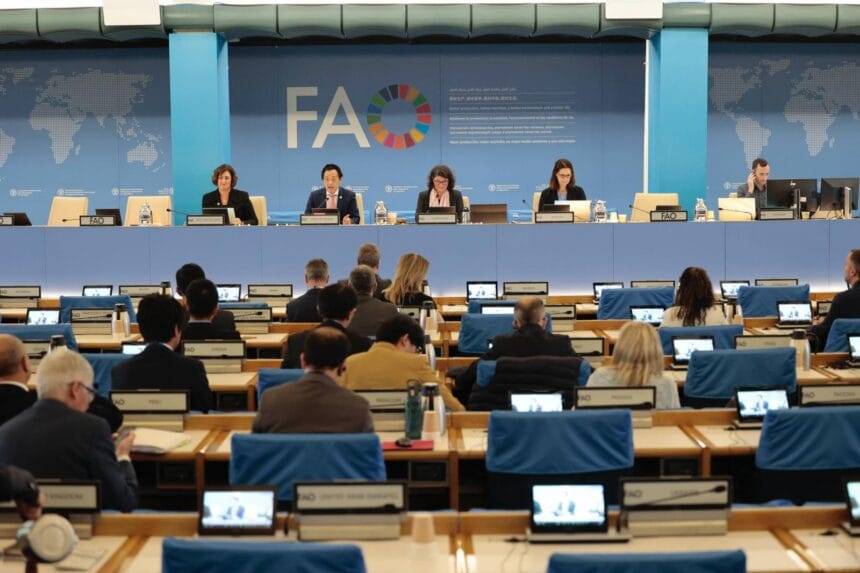Main Points In Hindi (मुख्य बातें – हिंदी में)
-
ग्लोबल भूख और खाद्य सुरक्षा का संकट: कृषि समिति (COAG) का 29वां सत्र रोम में शुरू हुआ, जो बढ़ती वैश्विक भूख और खाद्य सुरक्षा की चिंताओं के बीच कृषि खाद्य प्रणालियों में सुधार की आवश्यकता पर जोर देता है। 2023 में 730 मिलियन से अधिक लोग भूख से प्रभावित हुए हैं।
-
संस्थागत भूमिकाएँ और सलाह: COAG, FAO का एक शासी निकाय, कृषि नीतियों पर मार्गदर्शन प्रदान करता है और उभरते मुद्दों पर सलाह देता है। यह खाद्य सुरक्षा, पोषण, ग्रामीण विकास, और प्राकृतिक संसाधन प्रबंधन जैसे क्षेत्रों में तकनीकी सलाह प्रदान करने पर केंद्रित है।
-
जलवायु संकट और नवाचार: बैठक जलवायु संकट, संघर्ष और आर्थिक मंदी के प्रभावों पर चर्चा करते हुए हो रही है, और इसमें कृषि की वैज्ञानिक दृष्टिकोण और नवाचार की भूमिका को रेखांकित किया गया है।
-
महिलाओं की स्थिति और विकास के उपाय: COAG सत्र में महिलाओं की स्थिति, पोषण, जलवायु परिवर्तन, और जैव विविधता जैसे मुद्दों पर चर्चा की जाएगी। FAO ने लैंगिक समानता और महिला सशक्तिकरण को कृषि खाद्य प्रणाली परिवर्तन का केंद्र माना है।
- सीओएजी की उपलब्धियां: COAG ने पिछले वर्ष की प्रगति पर विचार करते हुए कई उपलब्धियों को साझा किया, जैसे कि कृषि में प्लास्टिक के स्थायी उपयोग के लिए स्वैच्छिक आचार संहिता का विकास और जैव अर्थव्यवस्था पर क्षमताओं को बढ़ाना।
Main Points In English(मुख्य बातें – अंग्रेज़ी में)
Here are the main points from the provided text regarding the 29th session of the Committee on Agriculture (COAG) in Rome:
-
Urgent Need for Change in Agricultural Food Systems: The session addresses the pressing need to transform agricultural food systems due to rising global hunger and challenges posed by climate crisis, conflicts, and economic downturns.
-
FAO’s Role and Responsibilities: As a governing body, the COAG provides guidance on agriculture-related policies, reviews global agricultural issues, and offers technical advice on interconnected topics such as food security, nutrition, and sustainable resource management.
-
Impact of Food Insecurity: In 2023, over 730 million people were affected by hunger, with approximately 2.8 billion unable to access healthy diets, highlighting the critical concerns regarding food security in achieving the 2030 Sustainable Development Goals (SDGs).
-
Strategic Priorities for Discussion: The session will focus on strategic priorities including sustainable management of plastics in agriculture, land and water resource management, the status of women in agri-food systems, and the integration of technologies and innovations to transform agricultural practices.
- Recent Achievements of FAO: The FAO has made progress in various areas, including sustainable plastic use, enhancing capabilities in bio-economy, addressing gender equality in agriculture, leading global conferences on sustainable livestock and agricultural mechanization, and implementing integrated water resource management efforts.


Complete News In Hindi(पूरी खबर – हिंदी में)
रोम – कृषि समिति (सीओएजी) का 29वां सत्र आज संयुक्त राष्ट्र के खाद्य और कृषि संगठन (एफएओ) के रोम मुख्यालय में शुरू हुआ, जिसमें लगातार उच्च वैश्विक भूख आंकड़ों और बढ़ती के बीच कृषि खाद्य प्रणालियों को बदलने की तत्काल आवश्यकता को संबोधित करने की मांग की गई। चुनौतियाँ।
एफएओ के एक शासी निकाय के रूप में, सीओएजी कृषि-संबंधी नीतियों पर मार्गदर्शन प्रदान करता है, वैश्विक कृषि मुद्दों और रुझानों की समीक्षा करता है और उभरते विषयों पर सलाह देता है। इसकी प्रमुख भूमिकाओं में फसलों, पशुधन, खाद्य सुरक्षा, पोषण, ग्रामीण विकास, प्राकृतिक संसाधन प्रबंधन और अन्य परस्पर जुड़े मुद्दों पर तकनीकी सलाह प्रदान करना शामिल है।
4 अक्टूबर तक हाइब्रिड रूप में आयोजित इस वर्ष की बैठक, जलवायु संकट, संघर्षों और आर्थिक मंदी के बढ़ते प्रभावों से उत्पन्न गंभीर दबाव के बीच हो रही है। 2030 एजेंडा और इसके सतत विकास लक्ष्यों (एसडीजी) को हासिल करने में केवल छह साल बचे हैं, दुनिया भर में खाद्य असुरक्षा एक बड़ी चिंता बनी हुई है। 2023 में 730 मिलियन से अधिक लोग भूख से प्रभावित हुए और लगभग 2.8 बिलियन लोग स्वस्थ आहार लेने में असमर्थ रहे।
महानिदेशक ने कहा, “आज जब हम मिलते हैं, तो हमें याद आता है कि हमारी कृषि-खाद्य प्रणालियाँ भारी चुनौतियों का सामना कर रही हैं।” “लेकिन हमें यह भी याद रखना चाहिए कि हमारे सामने बहुत बड़े अवसर हैं।”
महानिदेशक ने हाल ही में भविष्य के लिए संयुक्त राष्ट्र शिखर सम्मेलन और न्यूयॉर्क में संयुक्त राष्ट्र महासभा में अपनी उपस्थिति को याद किया, जहां वैश्विक नेताओं ने किसी को पीछे न छोड़ने और सभी के लिए बेहतर भविष्य बनाने की हमारी सामूहिक प्रतिबद्धता की पुष्टि करने के लिए मुलाकात की थी।
उन्होंने कहा, न्यूयॉर्क में अपनाए गए भविष्य के समझौते ने वैश्विक कृषि खाद्य प्रणालियों को अधिक कुशल, अधिक समावेशी, अधिक लचीला और अधिक टिकाऊ बनाने की महत्वपूर्ण आवश्यकता को पहचाना।
पिछले हफ्ते कृषि मंत्रियों की जी7 बैठक में, एफएओ ने जलवायु संकट के प्रभावों को दूर करने और कम लागत में अधिक उत्पादन सुनिश्चित करने के लिए कृषि में विज्ञान और नवाचार के महत्व पर फिर से जोर दिया, ताकि यह सुनिश्चित किया जा सके कि हम अपने पर्यावरणीय प्रभाव को कम करते हुए बढ़ती आबादी को खिला सकें। कहा।
महानिदेशक ने कहा कि एफएओ COP29 तक की अगुवाई में भी सक्रिय भूमिका निभा रहा है ताकि यह सुनिश्चित किया जा सके कि कृषि खाद्य प्रणालियाँ चर्चा के केंद्र में रहें।
कृषि खाद्य प्रणालियों के प्रति एफएओ के परिवर्तनकारी दृष्टिकोण का समर्थन करने के लिए, इस सप्ताह सीओएजी की बैठक में निम्नलिखित विषयों सहित रणनीतिक प्राथमिकताओं पर चर्चा और सलाह दी जाएगी: पशुधन; एक स्वास्थ्य दृष्टिकोण; कृषि में प्लास्टिक का सतत प्रबंधन; भूमि और जल संसाधन; जैवअर्थव्यवस्था; कृषि और वानिकी संबंध; कृषि-खाद्य प्रणालियों में महिलाओं की स्थिति; पोषण; जलवायु परिवर्तन, जैव विविधता और खाद्य सुरक्षा संबंध; उपेक्षित और कम उपयोग वाली प्रजातियों की संभावना; साथ ही कृषि खाद्य प्रणाली परिवर्तन के लिए प्रौद्योगिकियों और नवाचारों को अपनाने में सुधार करना।
आज तक की उपलब्धियां
सीओएजी सत्र अपने सदस्यों को 2022 में इसकी आखिरी बैठक के बाद से हुई प्रगति पर विचार करने की भी अनुमति देता है।
उपलब्धियों में शामिल हैं:
- सीओएजी के अनुरोध के बाद, एफएओ ने कृषि में प्लास्टिक के टिकाऊ उपयोग और प्रबंधन पर अपने काम को मजबूत किया है, इसके टिकाऊ उपयोग और प्रबंधन पर पहली स्वैच्छिक आचार संहिता विकसित की है।
- एफएओ ने कम कार्बन वाले भविष्य की ओर बढ़ने और जलवायु परिवर्तन के प्रभावों और जैव विविधता के नुकसान को संबोधित करने के लिए जैव अर्थव्यवस्था पर क्षमताओं और ज्ञान को बढ़ाना जारी रखा है।
- इसने “पर रिपोर्ट लॉन्च की हैकृषि-खाद्य प्रणालियों में महिलाओं की स्थिति”जो इस धारणा को मान्य करता है कि लैंगिक समानता और महिला सशक्तिकरण कृषि खाद्य प्रणाली परिवर्तन के केंद्र में हैं
- पिछले दो वर्षों में, एफएओ ने ऐतिहासिक वैश्विक सम्मेलन आयोजित किए हैं – जिसमें टिकाऊ पशुधन क्षेत्र और कृषि मशीनीकरण पर केंद्रित पहला सम्मेलन भी शामिल है।
- एफएओ कृषि में एकीकृत जल संसाधन प्रबंधन (आईडब्ल्यूआरएम) के प्रयासों का नेतृत्व करना जारी रखता है, कृषि में पानी की कमी पर इसका वैश्विक ढांचा (डब्ल्यूएएसएजी) इस क्षेत्र में महत्वपूर्ण भूमिका निभा रहा है।
- एफएओ ट्रांसबाउंडरी पौधों के कीटों और टिड्डियों, फॉल आर्मीवर्म, एवियन इन्फ्लूएंजा, पेस्टे डेस पेटिट्स जुगाली करने वालों (पीपीआर), और अन्य जानवरों की बीमारियों की निगरानी, प्रबंधन, प्रतिक्रिया और प्रसार पर अंकुश लगाने के लिए सदस्यों के साथ मिलकर काम कर रहा है।
- इन प्रयासों के केंद्र में वन हेल्थ दृष्टिकोण है, जो रोगाणुरोधी प्रतिरोध (एएमआर) से निपटने के लिए भी महत्वपूर्ण है।
Complete News In English(पूरी खबर – अंग्रेज़ी में)
Rome – The 29th session of the Committee on Agriculture (COAG) has commenced today at the Food and Agriculture Organization (FAO) headquarters in Rome. The session addresses the urgent need to transform agricultural food systems due to persistently high global hunger rates and rising challenges.
As a governing body of the FAO, COAG provides guidance on agricultural policies, reviews global agricultural issues and trends, and advises on emerging topics. Its key roles include offering technical advice on interconnected issues such as crops, livestock, food security, nutrition, rural development, and natural resource management.
This year’s hybrid meeting, running until October 4, is taking place amidst the severe pressures arising from the climate crisis, conflicts, and economic downturns. With only six years left to achieve the 2030 Agenda and its Sustainable Development Goals (SDGs), food insecurity remains a significant concern globally. In 2023, over 730 million people were affected by hunger, and nearly 2.8 billion people were unable to access healthy diets.
The Director-General remarked, “As we gather today, we must remember that our agricultural food systems face significant challenges. However, we should also recognize that there are great opportunities ahead.”
He highlighted the recent UN summit for the future and his attendance at the UN General Assembly in New York, where global leaders reaffirmed their collective commitment to leave no one behind and to create a better future for all.
The future agreements adopted in New York identified the critical need to make global agricultural food systems more efficient, inclusive, resilient, and sustainable.
During last week’s G7 meeting of agricultural ministers, the FAO emphasized the importance of science and innovation in agriculture to address the impacts of the climate crisis and to ensure increased production at lower costs, allowing us to feed a growing population while minimizing environmental impact.
The Director-General stated that the FAO is also taking an active role leading up to COP29 to ensure agricultural food systems remain at the forefront of discussions.
To support the FAO’s transformative approach to agricultural food systems, this week’s COAG meeting will discuss and advise on strategic priorities, including: livestock; a One Health approach; sustainable management of plastics in agriculture; land and water resources; bioeconomy; agriculture and forestry relations; the status of women in agricultural food systems; nutrition; the relationship between climate change, biodiversity, and food security; the potential of neglected and underutilized species; and improving the adoption of technologies and innovations to transform agricultural food systems.
Achievements to Date
The COAG session also allows members to reflect on the progress made since its last meeting in 2022.
Key achievements include:
- At COAG’s request, the FAO has strengthened its work on the sustainable use and management of plastics in agriculture and has developed its first voluntary guidelines on this topic.
- The FAO continues to enhance its capabilities and knowledge on bioeconomy to move towards a low-carbon future and to address climate change impacts and biodiversity loss.
- It has launched a report on the status of women in agricultural food systems, which supports the notion that gender equality and women’s empowerment are central to transforming agricultural food systems.
- In the past two years, the FAO has hosted significant global conferences, including the first conference focused on sustainable livestock and agricultural mechanization.
- The FAO continues to lead efforts in integrated water resource management (IWRM) in agriculture, with its global framework addressing water scarcity playing a crucial role in this field.
- The FAO collaborates with members to monitor, manage, and control transboundary plant pests and diseases, including fall armyworm, avian influenza, and peste des petits ruminants (PPR), among others.
- At the center of these efforts is the One Health approach, which is also vital for addressing antimicrobial resistance (AMR).








